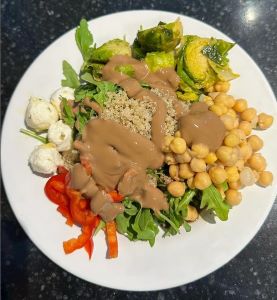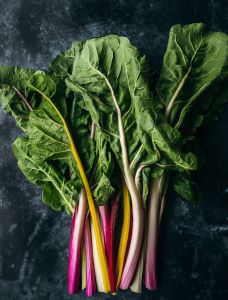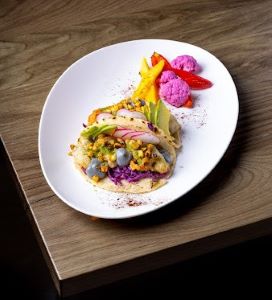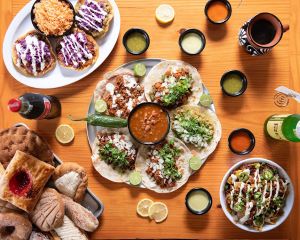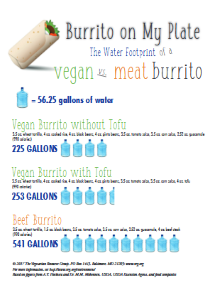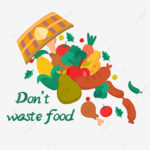Posted on
April 19, 2024 by
The VRG Blog Editor
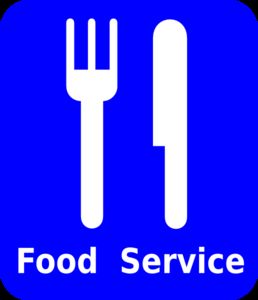
By Chef Nancy Berkoff, EdD, RD
So, perhaps some of your residents have requested vegan menus at your facility. Easy-peasy! Look at your menu and think which items on today’s menu don’t have meat, eggs, or dairy and build a vegan menu from there. For example, if you are serving pancakes, using a non-dairy pancake batter (US Foods, Smart and Final and Sysco have these), your vegan residents can enjoy these along with maple syrup and sliced bananas. Making omelets for your omnivore residents? Grill or sauté your mushroom, pepper, and onion filling then set aside some for your vegan residents. Vegans can have the cooked mushroom/pepper/onion filling with hash browns, half a baked potato, or corn tortillas.
Think about “building” salads and entrées without meat, dairy, or eggs and set these aside for your vegan residents. For example, if you are creating a macaroni casserole, cook and combine the macaroni, pea or veggies, then add some vegan margarine, and set aside to bake for your vegan residents. (You would then add other items and complete your omnivore preparations.) Preparing burritos? Create your cooked beans, tomatoes, onion, potatoes, and peppers filling and set aside for your vegan residents (and then you might add other items for your omnivores). Of course, if you have access to vegan meat alternatives and/or vegan cheese you could add these to your dishes.
If you have only one or two vegan requests, you can easily locate vegan canned soups, such as some Campbell’s Well Yes! (See: www.campbells.com/well-yes/vegan-soups), Amy’s, or Pacific Foods brands, as well as frozen veggie burgers. You can rotate these when your regular menu does not easily adapt for your vegan residents. Frozen veggie burgers can be served as a “stacked” burger (romaine or spinach, sliced tomatoes, pickles, shredded carrots, diced onions, relish, etc), crumbled and used for tomato “meat sauce,” or as the “meat” for casseroles, chili, or soups.
Here are just some of the items you probably make on a regular basis for everyone… and vegan residents can join in as well:
BREAKFAST
Hot cereal (leave out the butter and milk); fresh or frozen (thawed) fruit; dried apricots, apples, cranberries, and prunes; toast (with vegan margarine and fruit preserves); pancakes made from Bisquick (or equivalent, without added eggs or milk) served with maple syrup; and baked apples. (Always read current ingredients on products.)
Try baked oatmeal for a make-ahead breakfast or hot dessert. Spray a baking pan with vegetable oil and preheat the oven to 325 degrees. In a large bowl, mix together equal amounts of oatmeal and boiling water, and allow mixture to sit for about ten minutes, until oatmeal begins to soften. Add small amounts of chopped apples, raisins, or chopped canned peaches (or a combination), sliced ripe bananas, cinnamon, ginger, and maple syrup and bake until “set,” about 30 minutes. Serve warm as a breakfast casserole or dessert or chilled as a dessert.
LUNCH AND DINNER
Vegetable soup, split pea, navy bean, or lentil soup (prepared without meat), tomato soup, chili beans (prepared without meat), spinach salad, romaine salad, mixed greens salad, fresh tomato and cucumber salad, four bean salad (made with four types of canned beans, chopped onions, oil, and vinegar), fresh mixed fruit salad, fresh grapes, cooked rice or cooked grains (without chicken or beef stock or butter), cooked pasta, baked, steamed or roasted potatoes, baked sweet potatoes.
FOOD STORAGE AREAS
Your food storage areas most probably already contain many vegan items; no need to budget or shop “especially” for vegans:
IN THE PANTRY: canned fruit (in juice), unsweetened applesauce, canned pie filling, canned pumpkin, peanut butter, almond butter, nuts, dried fruit, dry pasta, rice, barley, quinoa, couscous, corn meal, canned beans and lentils, dried beans, split peas and lentils, potatoes, sweet potatoes, onions, canned vegetables, canned mushrooms, some canned soups (review the labels for meat or dairy ingredients), vegetable oils and vegetable oil spray, tomato sauce (review label for meat or dairy ingredients), vegetable base (rather than beef or chicken), Shredded Wheat, hot cereals, Bisquick, pancake mixes (review for dairy or egg ingredients), maple syrup, graham crackers (without honey), some cake mixes (check for egg or dairy ingredients), Ocean Spray cranberry sauce (check other brands, may contain gelatin), pudding mixes (can be made with soy or almond milk), shelf-stable (doesn’t need refrigeration) soy, oat, or almond milk
IN THE REFRIGERATOR: many breads (check for egg or dairy), corn tortillas, fresh fruits and vegetables, hummus, prepared mustard, pickles, olives, relish, ready-to-serve polenta, vegan margarine (check for dairy ingredients)
IN THE FREEZER: frozen pie crusts (check for dairy or egg ingredients or lard), frozen fruit (without sugar), frozen vegetables (without sauce), frozen hash browns and other potato products, sorbet (not sherbet, which has dairy)
Be sure to work with your purveyors for easy-to-prepare vegan entrées:
US Foods has some reasonably priced plant-based proteins: usfoods.com/great-food/featured-products/meat-substitutes.html
Sysco has veggie options, such as veggie meatballs: foodie.sysco.com/simply
Smart and Final and Costco have many vegan canned and frozen items, varying from store to store.
SOME FAST VEGAN IDEAS
Always talk to the resident about their specific needs and ingredient concerns.
BREAKFAST:
– hot cereal with maple syrup, toast with margarine, nut butter, sliced banana
– grilled or baked hash browns, sliced tomatoes or salsa, fresh or frozen berries
LUNCH:
– two bean taco or burrito with shredded romaine and chopped tomatoes, pudding made with almond or soy milk
– split pea or lentil soup
– baked sweet potato with crushed pineapple, raisins
SNACK:
– baked apple with chopped dried fruit
– hummus (or puréed bean dip) with toast or pretzels
– popcorn and orange slices
DINNER:
-sliced mushrooms served over pasta or rice, spinach salad or steamed spinach, sliced peaches
– baked potato topped with white beans and steamed veggies, seasoned carrots, sliced pears with cherries
– lentil stew (lentil soup with steamed potatoes, chopped tomatoes, mixed veggies), bread sticks or cut corn, applesauce with cinnamon
For information on serving larger quantities, bulk recipes, and beyond basic changes, see:
VRG VEGAN FOODSERVICE INFORMATION www.vrg.org/fsupdate/index.htm
Vegan in Volume by Chef Nancy Berkoff, RD: www.vrg.org/blog/2020/01/09/share-vegan-in-volume-with-local-restaurants-campus-dining-services-senior-housing-settings-hospitals-etc-6/
The contents of this posting, our website, and our other publications, including Vegetarian Journal, are not intended to provide personal medical advice. Medical advice should be obtained from a qualified health professional. We often depend on product and ingredient information from company statements. It is impossible to be 100% sure about a statement, info can change, people have different views, and mistakes can be made. Please use your best judgment about whether a product is suitable for you. To be sure, do further research or confirmation on your own.
